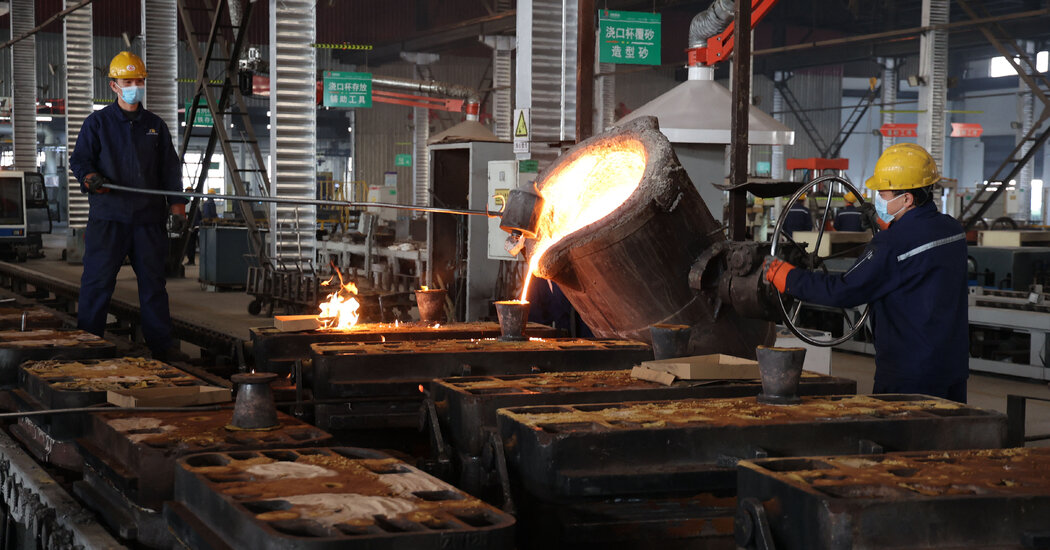The 25 percent tariffs President Trump imposed on Monday on all U.S. imports of steel and aluminum will primarily hit American allies, but at their heart they strike at his longtime nemesis: China.
The top five suppliers of steel to the American market in January were Canada, followed by Brazil, Mexico, South Korea and Germany. Canada has also led in aluminum exports to the United States, while the United Arab Emirates, Russia and China are far behind.
China does not export a lot of steel or aluminum directly to the United States. A succession of presidents and Commerce Department rulings have already imposed many tariffs on steel from China. Tariffs have also gone up lately on Chinese aluminum. Just last September, President Joseph R. Biden Jr. raised existing tariffs on many Chinese steel and aluminum products by up to 25 percent.
But China dominates the global steel and aluminum industry. Its vast, modern mills make as much of both metals, or more, each year as the rest of the world combined. Most of it is used within China’s borders, to build everything from high-rises and ships to washing machines and cars.
Yet lately, China’s steel and aluminum exports are on the rise because its economy is struggling, sapping domestic demand. Many of these low-cost exports have gone to American allies like Canada and Mexico, which in turn export significant shares of their own more expensive output to the United States. Other Chinese metal exports have gone to developing countries like Vietnam, which now buys enormous quantities of semi-processed steel from China, finishes it and then re-exports it as Vietnamese steel to buyers around the globe.
China’s rising exports have upset producers and labor unions in the United States.
“China’s overcapacity is swamping world markets and severely injuring U.S. producers and workers,” said Michael Wessel, the longtime trade adviser to the United Steelworkers of America.
China’s foreign ministry had little to say specifically about the planned steel and aluminum tariffs at its daily briefing on Monday. “Let me stress that protectionism leads nowhere. Trade and tariff wars have no winners,” said Guo Jiakun, a ministry spokesman.
The planned tariffs come a week after President Trump imposed a 10 percent tariff on all imports from China. Last week, China announced that it would impose retaliatory tariffs, which took effect on Monday, on liquefied natural gas, coal, farm machinery and other products from the United States.
China’s steel glut arose from an extraordinary boom in steel mill construction that started during the early 1990s and lasted for about 15 years, said Nick Tolerico, a senior steel trade official throughout the Reagan administration who then became the president of U.S. operations for ThyssenKrupp Steel of Germany. He is now a consultant advising investment firms and companies that buy a lot of steel.
Not since the 1940s has any country commanded the world’s steel industry on China’s scale today. The United States made half the world’s steel then, but its share has fallen since then to less than 5 percent.
For years, China’s construction industry used immense quantities of steel. A building boom produced abundant housing for the country’s 1.4 billion people and enough empty apartments for another 300 million people.
The overhang of empty apartments has now propelled a housing market crash and an abrupt stall in construction. Desperate to avoid shutting down, China’s mills have responded with a surge in steel exports to countries all over the world. They have accepted lower and lower prices for their steel over the last several years, triggering a global erosion in prices.
The falling prices have hurt the American steel industry, a politically powerful constituency in key electoral regions. The United Steelworkers of America has its headquarters in Pittsburgh, at the core of the industry’s longtime base in Pennsylvania, which has proved central to recent presidential elections. U.S. Steel, an emblem of America’s formerly outsize role in steel production, is also based in Pennsylvania.
The steel trade backlash against China is not confined to the United States. Brazil, Canada, Indonesia and Turkey have all raised tariffs sharply in the past year on steel from China.
During his first term, President Trump imposed supplemental 25 percent tariffs on steel and 10 percent tariffs on aluminum imports from all over the world. He then exempted big steel-producing countries like South Korea, Australia and Brazil from the tariffs in exchange for their imposing quotas for how many tons of steel they would ship each year to the United States. But he left the tariffs in place for China.
The trade protections helped the American steel industry, which over the past six years has increased its capacity by about one-fifth, building modern steel mills. Older, less efficient mills have started to run at less than full production.
By the last week of January, steel mills in the United States were operating at 74.4 percent of capacity, according to the American Iron and Steel Institute, a Washington-based industry group.
Siyi Zhao contributed research.

